Andrew Collins's Blog, page 25
February 27, 2013
Walk-on by

I’m not on actual telly very much these days – which is partly my own doing: I have turned down a number of opportunities to be on various news couches of late, and I’ve been hard at it behind a laptop for much of the last year, concentrating on what, I hope, I do best – so I cannot resist making a fuss of this. As the Sky subscribers among you may know, as it was heavily trailed, one of the ten ten-minute films packaged up under the umbrella Common Ground, was written by me and Simon Day, its star. Based on a character we originally wrote for a feature-length comedy for C4 called Personal Training, the name of our episode was Colin – also the name of the personal trainer around whom it revolves – and it aired on Monday night on Sky Atlantic. (I am inordinately excited about having had my name flash up onscreen on the same channel that shows Girls and Boardwalk Empire.)
It is the result of two mad days’ filming in and around Clapham Common in early October last year, as blessed production company Baby Cow completed all ten films in 20 consecutive working days, with producer Ali McPhail and director Dave Lambert at the helm, and a redoubtable crew doing all the heavy lifting and keeping a cavalcade of comedians and actors supplied with coffee on parky days. That the results are already on telly is testament to the insane energy of the project, and of Sky’s commissioning process. By definition, it is a curate’s egg, as each ten-minute character piece is written by different writers, and they vary in tone and intent. I like to think of the format as “speed-piloting”. (We all want a longer commission; one or more may get lucky!)
Anyway, we must blame Dave Lambert for insisting that I do a “writer’s cameo” in Colin, which I did. For the benefit of Sky refuseniks, Virgin customers and Sky subscribers who might have been paying attention to the dialogue taking place in the foreground, on the bench, between Simon and young actor Harry Foster (as Colin’s sole, 12-year-old client), this is it. Hey, I co-wrote that dialogue, so I’d rather you were listening to it than watching a man in an all-weather Blue Harbour coat tramp past, right to left, but I was that man. It was me all along! And I think you’ll agree I walked pretty bloody convincingly. Other, trained actors were impressed.
For the record, my favourite of all the Common Ground mini-adventures so far (and there are two to go – 9pm, Sky Atlantic, Monday), has been Sunshine Simon, starring and written by Tom Davis and Eleanor Lawrence. (There’s a free clip here.) I hope that one gets a series.
And ours.






February 26, 2013
The new serious
 So much to fit in, so little Telly Addict! I know, I know, I promised to cover The Walking Dead and Spartacus: War of The Damned this week – due to popular demand from gorehounds – and I will, I will, but both long-form series have had to be “put back” to next week, to clear space for two one-offs which need to be addressed this week: surprise treat The Fried Chicken Shop on C4 and Meet The Izzards on BBC2. There’s also The Brits 2013 on ITV, with its new “serious” tone; the series finale of the magnificent Utopia on C4; and surely the best moment on The Jonathan Ross Show on ITV, like, ev-ah! You’ll see what I mean. (Oh, and I’ll do the best of Seth MacFarlane on the Oscars next week, too.)
So much to fit in, so little Telly Addict! I know, I know, I promised to cover The Walking Dead and Spartacus: War of The Damned this week – due to popular demand from gorehounds – and I will, I will, but both long-form series have had to be “put back” to next week, to clear space for two one-offs which need to be addressed this week: surprise treat The Fried Chicken Shop on C4 and Meet The Izzards on BBC2. There’s also The Brits 2013 on ITV, with its new “serious” tone; the series finale of the magnificent Utopia on C4; and surely the best moment on The Jonathan Ross Show on ITV, like, ev-ah! You’ll see what I mean. (Oh, and I’ll do the best of Seth MacFarlane on the Oscars next week, too.)


February 19, 2013
Lewis, Louie, oh baby
 In a packed Telly Addict this week, I attempt, within the standardised ten-minute timeframe, to review the following: the final episode of Lewis on ITV (albeit without mentioning the name of the murderer in this final two-part mystery); Louie on Fox (which I’ve allowed three weeks to “bed in” before assessing); Common Ground on Sky Atlantic (which is a series of shorts to which I have contributed – this is a diplomatic highwire act!); plus two glossy new US dramas, Nashville on More4, and Vegas on Sky Atlantic, with a quick mention of Friday Night Lights, also on Sky Atlantic and now entering what looks like a scorched-earth fourth season. Don’t say I don’t watch enough telly for you. (Incidentally, the episode of Common Ground I co-wrote with Simon Day, Colin, is on next Monday. I won’t be reviewing it.)
In a packed Telly Addict this week, I attempt, within the standardised ten-minute timeframe, to review the following: the final episode of Lewis on ITV (albeit without mentioning the name of the murderer in this final two-part mystery); Louie on Fox (which I’ve allowed three weeks to “bed in” before assessing); Common Ground on Sky Atlantic (which is a series of shorts to which I have contributed – this is a diplomatic highwire act!); plus two glossy new US dramas, Nashville on More4, and Vegas on Sky Atlantic, with a quick mention of Friday Night Lights, also on Sky Atlantic and now entering what looks like a scorched-earth fourth season. Don’t say I don’t watch enough telly for you. (Incidentally, the episode of Common Ground I co-wrote with Simon Day, Colin, is on next Monday. I won’t be reviewing it.)


Kazoogazing
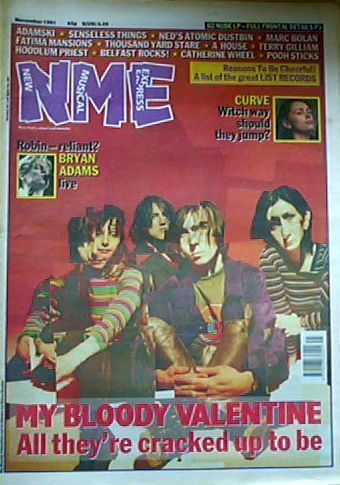
Better late than never. And I actually mean that. It has been 22 years since My Bloody Valentine released their second album, Loveless, and I dispatched myself to interview Kevin Shields, Deb Googe, Bilinda Butcher and Colm Ó Cíosóig at the Mitcham home of their manager, for the attendant NME cover story. It wasn’t an easy interview, but then, they weren’t an easy band, and they didn’t make easy records. They stood alone, despite being roped into a fabricated “scene”, cheekily christened Shoegazing. (It was the effects-driven, languidly-paced, pale-faced guitar bands who bloomed in MBV’s wake who really deserved the tag. Oh, and we gave one of them a cover, too – Chapterhouse – a notoriously poor-selling issue, as I recall, despite a decent story written on the road in the States and a fantastic coverline: “Here’s Looking At Shoe, Kid.”)
I fell in love with My Bloody Valentine on first listen, which will have been Strawberry Wine on the Lazy label’s EP of the same name in 1987. Not their first release – I can’t claim to have been in at the ground floor, but then, I was never a tastemaker – but my first listen. It was, of course, You Made Me Realise, in August 1988, that took them to a new level of originality and raw power, and if you weren’t smitten then, you were never going to be a convert.
I had arrived at the NME by the summer of ’88, and, as a result, from my vantage point within the citadel, their subsequent releases arrived, for free, in 12-inch record envelopes from Creation, with my name on. (I would have bought them had my life taken a different turning.) I only saw the band live once, which was at the Town & Country Club in December 1991 on the Loveless tour, but it blew my mind, as promised. (Our deputy editor, Danny Kelly, had been to see them at the beginning of the tour to review, and claimed that during the now-legendary ear-bleeding take on You Made Me Realise, his plastic pint glass flew off the edge of the balcony through the sheer sonic force. We believed him.)
I still hold Loveless to be one of the great albums of all time, never mind one of the great albums of its era. Though it has individual tracks – and a single, in the rave-inflected Soon, which Shields neatly calibrated at the end – it’s one of digitally recorded music’s most persuasive arguments for the Long Player. I had MBV’s early releases on vinyl, but Loveless arrived on CD, and it feels tailor-made for the single listen. You can’t shuffle it. (Well, you can, but you shouldn’t, you philistine.)
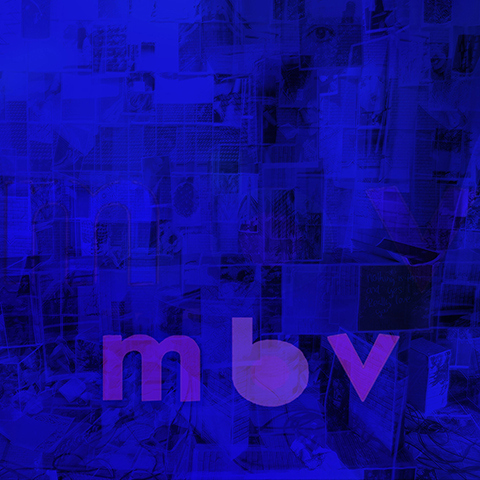 So, to their third album. (Not a sentence I thought I’d write in my lifetime. Certainly not until the band reformed for those Roundhouse shows in 2008 and Shields started dropping tantalising hints about the record they’d started in 1996 being “three-quarters” finished!) Titled, annoyingly but with scorched-earth defiance, m b v, it arrived on February 2 with almost no fanfare, like the David Bowie single. But would it be any good? I only got my hands on it two days ago, but I’m here to tell you that it was worth the wait – a wait, lest we forget, during which you could have given birth to a child and watched him or her leave home for university.
So, to their third album. (Not a sentence I thought I’d write in my lifetime. Certainly not until the band reformed for those Roundhouse shows in 2008 and Shields started dropping tantalising hints about the record they’d started in 1996 being “three-quarters” finished!) Titled, annoyingly but with scorched-earth defiance, m b v, it arrived on February 2 with almost no fanfare, like the David Bowie single. But would it be any good? I only got my hands on it two days ago, but I’m here to tell you that it was worth the wait – a wait, lest we forget, during which you could have given birth to a child and watched him or her leave home for university.
Due to the arse-over-tit way I uploaded the album from WAV files to iTunes – and because of the unbearably non-intuitive, counterproductive latest version of iTunes, particularly its search facility – the first time I fired it up from the laptop, it would only play randomly, which was a crime against humanity. I’ve fixed this now. Fortunately, my maiden listen was via my iPod, where it plays in order. So when I’ve been listening to it in transit – and it really suits gazing not at shoes but out of train or bus windows – I’ve experienced it as a whole, in full, from one end to the other. It’s a glorious piece that runs to about 46 minutes over nine tracks. (Loveless runs a little longer, but over 11 tracks.)
Along the way, considering the langorous timeframe, during which time dictatorships have been toppled and wars begun and ended, not so much has changed in the My Bloody Valentine universe. The palette of multiple slightly and not-so-slightly distorted guitars, washed over with sounds that appear to have emanated from synths but, unless the Shields manifesto has changed, won’t have done, is recognisable. (Their tricks have been much copied, and adapted, but still nobody sounds like them.) While the dancey nature of Soon bamboozled us in 1991, it’s the jaunty nature of New You that’s the album’s most generous, head-turning surprise. While opening salvos She Found Now and Only Tomorrow remind us of Loveless, New You, brilliantly named, reminds me of Can’s I Want More in feel, and adds a bona fide bounce to proceedings, as Butcher coos somewhere in the middle distance. It’s a cornerstone track. You have to hear it.
Elsewhere, the drone, screech and aerobatic stream are present and correct, and uneasy listening is the captivating result. If someone listened to m b v, or Loveless, and declared it “noise”, you wouldn’t argue with them. It is. But a beautiful noise, as Neil Diamond might have had it. And nor would you try to convert them. For many, this music will go in one ear and, eventually, out of the other. Presumably this is why, with all the hype and expectation, Loveless only got to 24 in the charts 22 years ago. You really do need to tune in, and if not, walk out.
The changes are subtle. An optimism seems to come out in the vocal in Who Sees You, although I wouldn’t stake my reputation on it. Is This And Yes bears the unmistakable addition of a keyboard pulse, atop which the vocals positively glisten. If I Am cruises along on a ragged snare beat with woozy vocals that almost take it into Stereolab country. The rhythm on In Another Way is furious – albeit tempered by the balm of Butcher’s serenade. Not so on the instrumental Nothing Is, where this same rhythm is almost repeated but to a much grungier end. Most adjustments, though, are closer to imperceptible. But then, it wasn’t broke, so why fix it? (For alphabetical reasons, when the album ends on iTunes, it goes straight into the mechanically rhythmic Machine Gun by Portishead. A sympathetic transition, actually.)
Yes, m b v sounds like the entire sonic cathedral has been filtered through a single kazoo, but the genius of that! And it ends with a mighty six-minute track that seems to have been sculpted from sampled train and plane noises, Wonder, which pretty much confirms my suspicions that it’s for listening to between A and B. Where Soon brought Loveless to an accessible close, Wonder might be the most difficult movement on m b v. It climbs and climbs as if barreling up a mountain with no intention of coming back down.
I actually don’t mind if the fourth MBV album comes out in 2035, if it’s this good. I really, actually don’t.


February 14, 2013
Valentine’s Day isn’t over

Forgive the reveille on my own horn, but today is Publication Day, and that’s not something I’ve been able to say, in truth, since July 2008, when the third part of my trilogy of memoirs, That’s Me In The Corner, was published in “B-format” paperback. (B-format is when your book isn’t important enough to come out in hardback, so instead comes out as a large-size paperback first, and then in a cheaper, more manageable size a year later. This never made much sense to me, but it does give you the chance to have the cover redesigned, which we did with That’s Me In The Corner, not that it had any impact whatsoever on sales.) Today, the first book I ever wrote is re-published, and re-printed, in a new edition: Still Suitable For Miners, the official biography of Billy Bragg.
This is what it looked like when it was first published, in 1998, with a portrait by my old pal, the late Hugo Dixon on the cover (from the session he took for Q). I’m not sure I can convey how proud I was when I first laid my hands on a copy of this “A-format” or “trade” paperback.
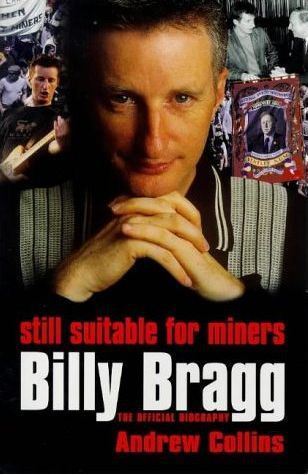
And this is what it looked like when it came out in “B-format” paperback, the “revised and updated” 2007 third edition, in fact, with a photo by Steve Double in more austere black and white. (It’s funny. I’m sitting in the British Library right now with a copy of the third edition on my desk next to me, as I was due to be interviewed by a student about Red Wedge, so I was refreshing my memory about the era. I wonder if anyone has ever ordered it up in this very reading room?)
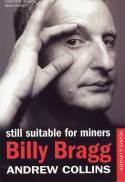
The brand new cover, at the top, has been designed by Marc Woodhouse at Chemical X, with the pugnacious photo from Billy’s Fight Songs albums. Here are some grabs from a little film the now generously-bearded Billy and I made, with director Jack Lilley behind the camera, at Billy’s house in January, where we discuss the origins of the book in our jumpers.



When this film is posted somewhere, I’ll put a link to it. But in precis, this is how the book came to be written:
In 1997, two important events conflated: I gave up my day job, and Billy Bragg turned 40. I’d been in a series of full-time desk jobs in music magazine publishing since 1990 – NME, Select, Q – and my first taste of professional TV scriptwriting had given me the courage to go freelance. And old inkies cohort, Ian Gittins, had just left Melody Maker to take up a post at Virgin Books, where he was charged with commissioning some official music biographies. He asked me if there was anyone I had a burning desire to write a book about. There was only one, really. I’d met Billy in 1991 when I first interviewed him for the NME, and we’d it hit off (I’d been a fan since the early days). I interviewed him again at Q, this time writing a career piece, punctuated by what I’d noticed were the “epiphanies” in his life. The big four-oh had convinced him to allow his life to be turned into a book, and in his wisdom he decided I was the man for the job (mostly, it turned out, because I was never po-faced about his work, and he was desperate to avoid a po-faced account).
I love telling people this: I researched the book, over six dedicated months from the end of 1997, by sifting through plastic bags full of cuttings. I had a computer, but not a modem, and no email address. All of the interviews I conducted were in person, or over the phone, or, in the case of Neil Kinnock, by fax between London and Brussels. That’s how analogue Still Suitable For Miners was. Billy was more than generous with his time, and his petrol money (we drove to Barking and all around the Essex of his youth, and to Oundle where he recorded his first music with Riff Raff), and I ended up with hours of first-hand testimony. I also flew over to Dublin, where he and Wilco were finishing the career-changing Mermaid Avenue sessions. In order to access the message boards on his brand new website, I had to sit at his then-assistant Tiny’s kitchen table and log onto her PC.
It would be true to call it a labour of love, in that I loved doing every minute of it, and my publishing advance was modest, as befits a first-time author, but the fact that I’ve been able to update it with a brand new chapter three times, in 2001, 2007 and 2013, makes it less a job, more a way of life. This gives me the excuse to spend some time down in Dorset with Billy and his partner Juliet, who became real friends during the writing of the book.
I have never stopped admiring Billy for his principles and his drive, and his honesty. Though the book is authorised, and fact-checked by Billy and Juliet each time it is reprinted, it is still the book I wished to write, and I remain grateful that the subject of the book never tried to edit it, or rewrite his own history. That said, if you’re looking for scandal, you’ve come to the wrong place. The one truth that works against Billy, but for him at the same time, is that he’s no man of mystery. He really is the Ronseal rock star. What you see is what you get. If you go to a Billy Bragg gig, especially in a far-flung place, you’ll know that the meet-and-greet is often as long as the concert. He likes to engage personally, as much as politically.
I once pitched the idea of a definitive Billy Bragg story to Mojo magazine, and was turned down flat by the then-editor, who reasoned that there was nothing the magazine’s readers didn’t already know about Billy. It’s true, he’ll never be the subject of one of those Reputations-style documentaries, exposing the “real Billy Bragg” behind the public image. But that’s why he’s such a constant in an ever-changing world.
To be Billy Bragg’s Boswell is no bad outcome as I hit my 25th patchwork year in the media, I must admit. It may not make me rich, but it makes me very proud. And to have my first book out now as an eBook feels like an important enough milestone to provide a link to my publisher’s website, which at least offers alternative download routes as well as the contentious Amazon. (Billy provides one-click links to Amazon, among others, on his website through industrial necessity – an ideological anomaly he’s happy to debate with you via the official forums including Twitter, which is really him on the other end, by the way.) For all your Billy Bragg needs, this is his HQ, with everything about his forthcoming new album Tooth & Nail - out on March 18, and among his best, I’d say. The new chapter covers this, his previous album Mr Love & Justice, his 50th birthday, the Jail Guitar Doors initiative, the current Tory government and the 2010 general election, plus honest accounts of the death of his Mum and the graduation of his son, Jack, to aspiring musician.
If you wish to buy the print copy, you can of course do so direct from Bragg Central and, as the old song goes, “cut out the middle man”!
Oh, and if you spotted the reference in the headline to this blog entry, you probably don’t need any more encouragement from me.


February 12, 2013
Marine biography
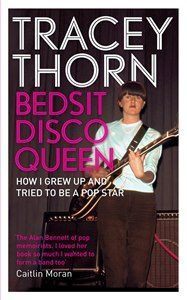
At last. I can review one of the best books I read last year. The reason I didn’t review it when I read it is that it’s published this year, and there’s no advantage to showing off that you’ve read a book before it is available in the shops. It is published now, in fact, in fancy hardback. Tracey Thorn very kindly sent me an advance copy of her memoir Bedsit Disco Queen and I devoured it quickly. (Sorry, The 9/11 Wars by Jason Burke, you had to be put to one side.) If you lived through any of the pop years covered in this book, but especially the early ones in the 80s, it will ring a bell, and possibly warm your cockles. It will almost certainly provide a cue for a song. (I found myself mainlining my old EBTG albums while reading it.)
Tracey, whom I’ve only ever met twice in the flesh, was kind enough to include me in her publisher’s advance-reading list as we’d corresponded as far back, I think, as 2007, when she was first researching her own life in pop. She wanted to know if I had a copy of the NME in which I’d interviewed Everything But The Girl in 1990. Sadly, I didn’t. (My NME archive is patchy, at best – I only kept the issues for which I’d written the cover stories after a scorched-earth loft clearout, although I ended up re-purchasing some from eBay, to replenish my self-vandalised collection.)
I’d been a card-carrying fan of Everything But The Girl – and Tracey’s first band the Marine Girls – since the early 80s and Pillows & Prayers. Their first album, Eden, and their second, Love Not Money, got me through my first years of college, and their fourth, Idlewild, is one of the albums that marks my post-graduation year and the first days of living on my own in a studio flat. (I will always regard Eden as one of my “homesickness” albums. I taped it off my first next-door neighbour at the halls of residence on arrival for the first time in London, and its jazzy melancholy was a perfect fit for the way I felt, as well as a tub of emotional balm.)
So, when I got to meet and interview Ben and Tracey in 1990, when the disarmingly slick, LA-recorded The Language Of Life came out, it was one of those big-tick moments: all my years of fandom could be pressed into professional, journalistic service. I’d love to say I met them at their house – the first journalists to interview them got to go to their student flat in Hull! – but alas, it took place at somebody else’s smart mews house in West London, as I recall. (A dastardly trick used to this day by celebrities on Come Dine With Me.) Tracey remembers the interview, perhaps too well, in her book.
Andrew Collins came to interview us for the NME, and he too focused on the fact that the best aspects of the album were our songs, and more specifically the caustic lyrics to a couple of them … We were lucky to get off as lightly as this with the NME, to be fair. By now the acid-house revolution, and the Madchester scene it had given rise to, was no marginalised alternative fad, but dominated both the rock press and the charts. Andrew Collins had turned up for that interview wearing baggy dungarees and a smiley badge, and I remember thinking, ‘Bloody hell, the game’s up if this how they dress at the NME now.’
In the interests of New Yorker-style fact-checking, I must stress that Tracey confirmed with me the possibility that I might have been wearing dungarees. I’m afraid it’s all too likely, smitten as I was by the Stone Roses style. I’m prepared to concede the smiley badge, which I suspect may have been affixed to this “scallydelic” top. (Here modelled by a lake in Hultsfred, Sweden, circa 1990, with Tim Burgess.)
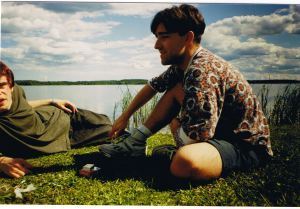
Now, as you can sense, I have a personal connection to the Tracey Thorn story. We’re of a similar vintage. We were in higher education at roughly the same time. (There’s a couple of years in it, which is how come she was already in a band making albums that helped me through my exams, as it were, in her immediate post-graduation years.) And that’s the beauty of the book. She simply tells her own story, and allows the observations made from the vantage point of the end of her forties to contextualise what she was going through at the time. When she first forms the band with Ben, she remember asking herself many speculatively melodramatic questions about their relationship, and concludes, from the distance of almost 30 years, “I didn’t really have the answers to any of these questions, and I’m not even sure I asked them.”
Bedsit Disco Queen is not raw with confession and emotion, which suits the private person Tracey has always been, but it is at all times honest. Her first memory of seeing Ben at Hull University is “blurred” (“What was he wearing? Levi’s probably? A white shirt?”); her early brush with leftwing politics is driven by interviews with other bands, like Gang of Four and Delta 5, who “introduced me to concepts and political theories which I was too young and inexperienced to comprehend fully – nonetheless, I agreed with every word”); and when she and Ben move to the country in 1989 to escape the rat race, she speaks of “a time-wasting fury of DIY mania” and confesses, “It took us about half an hour to discover we weren’t cut out for country life.”
Nobody is expecting self-aggrandising myth-making from a Tracey Thorn autobiography. After all, her songwriting has always been painfully honest and plain-speaking – and the full song lyrics seem especially suited to the chapters they now open: “I’m getting too used to this way of life” … “Now you’re feeling hopeless, now you’re looking older” … “Sure, I’d love a wild life, but every wild man needs a mother or a wife.” But this is not to say her rise-and-plateau-and-rise through fame and fortune is not without profound truths (that Massive Attack are locked into “playground relationships”, for instance), or, frankly, rollickingly entertaining insights. It ends on a hilariously random moment involving some younger female pop icons, for instance, which I won’t spoil.
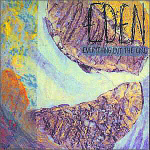
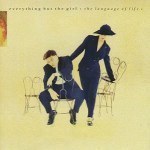
In yesterday’s Guardian interview, Decca Aitkenhead observed, “In another life Thorn would have been a brilliant columnist” (which rather unfairly precludes the possibility that she could become one now), and this is no truer in the book than when she ruefully reflects upon the advice given to contestants on The X-Factor by Lady Gaga after performing “inside a giant ten-foot bathtub” wearing “a tight, reflective leather cat costume” – “Be yourself.” From this spark, Tracey reflects upon the disconnect between authenticity and the pop industry, and her own struggles with truth and artifice.
She covers the big issues with candour, such as motherhood (admitting that, aged 25, she became broody over her sister’s little boy, but ruled it out at the time due to being “a singer in a pop group”), and Ben’s near-fatal illness (she poignantly remembers sitting by his bedside in hospital “doing jigsaw puzzles and reading PG Wodehouse”), but leaves out anything that might cheapen or coarsen the picture she wishes to carefully and diplomatically paint. (I innocently asked her about the absence of a particular player in email correspondence and she privately gave a perfectly decent and thoughtful reason for leaving them out.)
And my favourite passage of all is one about Twitter. Tracey has built a life-affirming community of souls around her on the social networking site, and, if anything, has raised her own profile by accident. (The Guardian piece was astutely headlined The Accidental Pop Star.) She wishes she could go back in a time machine to her and Ben’s lowest ebb, in 1987 – Idlewild, a harsh verdict from the record label, wrangles over the first single, career stalemate, boredom, self-doubt, anxiety – and “invent Twitter.”
I won’t quote it in full, as you should buy the book and read it in context, but it’s the most persuasive argument I’ve yet read for the positive effects of the sometimes maligned Twitter. She thinks, at that time, it would have been her “salvation,” imagining coming out of a depressing meeting at WEA and getting it off her chest by Tweeting about it. “You would have all Tweeted back with supportive comments, witty put-downs and descriptions of similar experiences in your own workplace,” she retro-fantasises. Back in 1987, of course, there was no direct way of communicating with fans, or like-minded souls, without a telephone or a stamp. You, too, will wish that you could go back in a time machine and invent Twitter for the 1987 Tracey Thorn.
I won’t put a link to the high-street-destroying Amazon, in the usual kneejerk fashion. You can find Bedsit Disco Queen your own way. Maybe you could order it via a local bookshop, or find one online, without using Amazon as a third party, and do it in the spirit of Cherry Red, who launched Tracey and Ben’s career. But this is her publisher’s website.


After you! No, after you!
 Last week’s Telly Addict broke box office records at the Guardian website – I believe I am right in saying that it was the most viewed of all my little, ten-minute TV reviews since April 2011. This week’s Telly Addict can only take a concomitant ratings dive, as it contains no full review of Mrs Brown’s Boys. I fully intended to assess the final episode of series three – the one with the gay wedding – on BBC1, but BBC1 forgot that it’s the most successful comedy on television and bumped the Saturday night repeat for the rugby, failing to find another home for it on any of its other BBC channels. (Let us not forget that the repeat was pulling four million viewers. Who needs ‘em, eh?) Instead – apart from a couple of spare clips from last week’s Mrs Brown’s Boys – it’s all about Dancing On The Edge, Stephen Poliakoff’s latest glacial masterpiece, on BBC2; Stewart Lee’s Alternative Comedy Experience vehicle on Comedy Central; Danny Baker’s magnificent Great Album Showdown on BBC4; and a little nod to what might be the final mystery for Lewis on ITV. Perhaps I should have reviewed the rugby. (Oh, by the way, I shall be passing judgement on Louie, belatedly, and Nashville, next week.)
Last week’s Telly Addict broke box office records at the Guardian website – I believe I am right in saying that it was the most viewed of all my little, ten-minute TV reviews since April 2011. This week’s Telly Addict can only take a concomitant ratings dive, as it contains no full review of Mrs Brown’s Boys. I fully intended to assess the final episode of series three – the one with the gay wedding – on BBC1, but BBC1 forgot that it’s the most successful comedy on television and bumped the Saturday night repeat for the rugby, failing to find another home for it on any of its other BBC channels. (Let us not forget that the repeat was pulling four million viewers. Who needs ‘em, eh?) Instead – apart from a couple of spare clips from last week’s Mrs Brown’s Boys – it’s all about Dancing On The Edge, Stephen Poliakoff’s latest glacial masterpiece, on BBC2; Stewart Lee’s Alternative Comedy Experience vehicle on Comedy Central; Danny Baker’s magnificent Great Album Showdown on BBC4; and a little nod to what might be the final mystery for Lewis on ITV. Perhaps I should have reviewed the rugby. (Oh, by the way, I shall be passing judgement on Louie, belatedly, and Nashville, next week.)


February 11, 2013
Cull all parents!


Here is the news. Regrettably, an urban fox got into a house in Bromley, South East London, whose back door was seemingly open while it awaited repair, and it bit a four-week-old baby. The baby’s finger was bitten off. (Surgeons were able to re-affix the finger, which is good news. Not much else about the story is good news.) Our balanced, responsible newpapers also reported “puncture wounds on his face”, although when the baby’s photo was published on the front of the Mirror and the Sun this morning, none were visible.
The story was related in terrifying, lurid detail, and we learned that the baby’s mother was “in the next room”, when she “heard a scream” and a “loud thud” when the baby was apparently pulled from its cot. She also described his little hand being trapped “halfway down the animal’s throat”. The three-hour operation was described as “tense.”
I don’t for one minute doubt the facts of the story. It’s a nasty story that will unnerve parents everywhere. You wouldn’t wish it on anyone. However, what bothers me is that those with an axe to grind against foxes, and animals in general, are already jumping all over this poor mother’s anguish. London Mayor Boris Johnson thundered, “We must do more to tackle the growing problem of urban foxes. They may appear cuddly and romantic but foxes are also a pest and a menace, particularly in our cities. This must serve as a wake-up call to London’s borough leaders, who are responsible for pest control.”
The first wake-up call surely goes out to Bromley council, who had left the mother without a working back door, certainly by her account. The family have, it seems, been rehomed by the council, but if it’s a council deficiency that caused a door not to be repaired or replaced then the real wake-up call goes to the Government, who are decimating council budgets up and down the country in order to pay for their rich friends’ lifestyles and various colonial military adventures.
It’s essentially a tabloid story (and you have to admire their cheek with the way the photo of the poor baby is telescoped so that its injury looks as big as another baby), but well done to the Telegraph for this added flourish: “A child’s red pair of shoes and a deflated football remained in the front garden of the end of terrace property.” A neighbour, Khadine Peters, 36, was doorstepped by the eager Telegraph reporter, said, “I wasn’t there at the time, I was walking home down the street when I saw the ambulance outside the house.” Not much use as a witness, then. However, she had an opinion. “I definitely won’t leave my back door open again. Something needs to be done about all these foxes roaming freely around all these homes. They’re disgusting, they’re not cute pets, they’re vermin. The council should get rid of them.” (Who, by the way, leaves their back door open, and unmonitored? It’s the 21st century. A burglar is more like to come in than a fox.)
Thankfully, we heard from a spokeswoman for the RSPCA, who said the only reason that a fox would ever attack is due to fear, adding, “It’s extremely unusual for foxes to attack young children or anyone. It’s not typical fox behaviour at all. Foxes will come closer to a house if there are food sources.”
The truth is, like it or not, we share our cities with animals, including foxes, and it can’t be long before we hear the c-word: cull. Cull the foxes! Cull the badgers! Cull the deer! (It sounds a bit like “kill” but it’s more socially responsible.) People who live in towns are mad for culls. They resent wildlife encroaching upon territory they have helpfully marked out as their own by putting up fences and gates and walls around. How dare “disgusting” animals fail to recognise that boundary? (Any cat owners ever observed a cat when a door in the house it expects to be open is closed? Ours just sits there and looks at it, until somebody opens it. Animals do not recognise physical boundaries. At best, they confuse them. At worst, they frustrate and irritate them.)
What do urban foxes live off? Food we throw away and leave outside. We feed them. That’s why they thrive. If I were a fox, I feel certain I could live off the food that various householders round my way leave out on refuse-collection day, because they helpfully put it out the night before, not in a bin, but protected by a special fox-deterring meniscus of thin black plastic called a bag. (On my Monday morning walk to the shop for my newspaper, I measure out my progress by the torn-open bin bags containing fragrant leftover food. Oh, and our bin collection occurs after breakfast, so putting it out the night before in exposed bags is nothing short of stupid.)
Assuming it’s adults who leave the bin bags out, then why not cull them? Cull the parents! Cull the idiots!
I don’t have a newborn baby. If I did, I would not leave doors and windows open, which is usually the way when babies are attacked by foxes. And yet, nobody ever blames the parents. (Me? I always blame the parents!) It would be a preposterous and unthinkable idea to cull people. So would culling foxes because they inconvenience us, and expose our slovenly habits, and our knackered infrastructures. We have to learn to live together. Either that, or stop feeding the animals. (It always amazes me how bloodthirsty some people are. You may or may not remember “WHY I HATE SQUIRRELS!”, the SCREAMING Daily Mail manifesto in 2010 for urban blood sport and the judicious use of the back of a spade by the obviously-bullied Quentin Letts, which I wrote about here, at the time.)
There’s an urban fox attack every couple of years. That’s a lot of foxes not attacking a lot of babies in the interim. It’s rare. They are not hunting for babies. They are trying to survive. When we get hungry, we go to a shop and buy a thing that somebody else has made for us in a factory. When an animal gets hungry, unless it’s one of our pets, it goes to forage and hunt for food, wherever it can find it. We sometimes get in the way with our fences and a our plastic bags and our broken doors and our babies’ hands.


February 6, 2013
Writer’s blog: Week 6, Wednesday
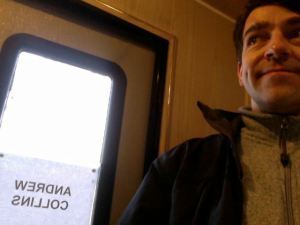
At last. I’m doing something interesting. It’s Wednesday, and instead of photographing myself self-consciously looking to one side in the British Library canteen, or on a train, I write today from Glasgow, which in itself is unusual, and from within a caravan, which is even more unusual. This caravan is my dressing room, for today I am an actor. Look, there’s my name on the door. The caravans are parked up in the car park of a suburban industrial estate, which is where Scottish production company The Comedy Unit live. (They live in a unit.) They are currently making Secret Dude Society for BBC3, or “the Pappy’s sitcom” as it’s colloquially known.
My work as script editor finished just before Christmas, when pre-production turned into production, and any further edits to the script would be the responsibility of the writers and producer. I have just been into makeup (which is another, bigger caravan) although you won’t notice, as I have been made up to look like myself. This is because I am playing “Andrew Collins” in the show. I only have two lines, but it’s a lovely gift from Pappy’s, in return for being the schoolteacher who’s been marking their homework with a red pen since September.
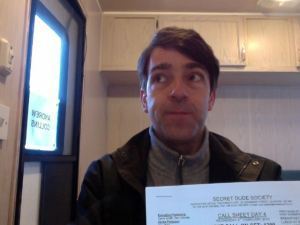
An actor’s life can be a lonely one. I have discovered that. I am alone in my caravan. The other three actors who are filming today are in their own caravans. Whenever my next-door neighbour, the actor Kim Wall, enters his caravan, it shakes, and so does mine. I am holding up today’s call-sheet in the picture above, but have been careful not to show anything that’s on it, as I suspect this is not for public consumption. I will have to check with the producers before I reveal any more about my cameo role. In fact, I’d rather keep it a secret until the show is broadcast – it’ll be more fun that way. I am expecting to be called to costume any moment, so I’ll stop typing.
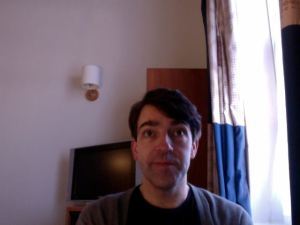
Another rare thing was waking up in a hotel room this morning. There is something slightly extravagant about taking a train up to Glasgow and being put up in a hotel in order to deliver two lines in a sitcom, but that’s entertainment. There is also something about travelling alone that lends you the air of a sales rep. Breakfast for one, all that. Fortunately, I was rescued from the tragedy of eating room service, alone, last night, as Pappy’s – that is, Matthew, Ben and Tom – are pretty much living up in Glasgow for the duration of the show and they took me to their local tapas bar, where we drank beer and picked at “small plates” until midnight, subsequently joined by none other than my old radio pal Josie Long, The Pictish Trail aka Edinburgh’s fine-bearded Johnny Lynch, and “young comedian” Tom Deacon, who I like very much. (Tom is also up to deliver two lines for Pappy’s.)

Anyway, here’s another pathetic shot of me in Room 212 at the Abode Hotel (or the Adobe Hotel, as Matthew erroneously calls it, imagining it to be photoshopped and daubed with mud). It’s nice to stay in pleasant hotels, but it’s nicer to stay in them with a friend, spouse or partner.
Hey, I like to think of myself as well-travelled, but until today I had never seen or used one of these before:
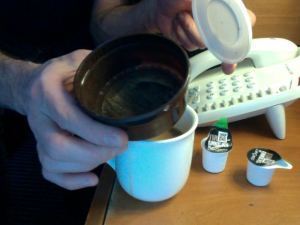
It’s a kind of self-contained, ready-loaded individual plastic coffee filter-ette. Environmentally destructive, it also makes a disgusting cup of coffee, I discovered this morning while waiting in my room to be picked up and ferried to the “unit base” and thence to the filming location. (Mind you, I put UHT milk in it, and that’s against nature, and the downside to making coffee in a hotel room is, of course, that you use water from a bathroom sink, which isn’t for drinking.)
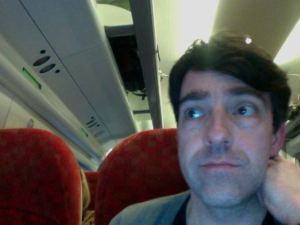
As I type, I’m on the train home from Glasgow and back in the stultifying realms of the usual sort of Photo Booth picture I take of myself for Writer’s Blogs. The actual filming took very little time, although it was thrilling to be around technicians and crew who know exactly what it is they’re doing. It’s like a well-oiled machine. If something went wrong, you just know these people would deal with it, and get back on schedule.
Director Ben Kellett (the man you see at the end of Mrs Brown’s Boys, taking a bow with the rest of the crew and family), whom I’d never previously met, seems to be “on it”, and Pappy’s seem pleased with the way the show’s panning out. I won’t give anything away about my tiny cameo, or Tom Deacon’s, but it’s in what’s planned as the final episode, and this was my costume. (I wore my own trousers.) Oh, and when I mischeviously Tweeted the shirt earlier, one brilliant wag asked, “Are you playing Jason Manford.” Now that’s comedy.

It’s been a fun trip. I managed to write a 1,000-word feature on Judd Apatow for Radio Times on the train journey up, and my Films Of The Day copy for Radio Times on the train journey back. I’m like a shark; if I stop moving, I die.
By now, this caravan will have been converted back into a dressing room for the next actor. But it was mine for a couple of hours. Mine.
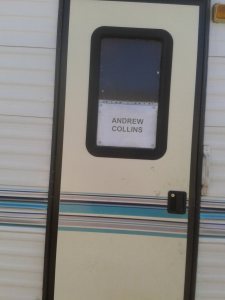


February 5, 2013
How now, Brown, how?
I take the plunge this week on Telly Addict by watching a whole episode of Mrs Brown’s Boys on BBC1, the most successful sitcom on British television, just in time for its third hit series to end; also, back to Utopia on C4, which I can’t stop thinking about, or reviewing; and two recommendations from the Freeview universe: the second season of Suits, on Dave, and the fourth of The Good Wife on More4, both slick, glamorous, fast-talking US legal dramas, as it happens. Oh, and a definitive “Now, If You’ll Excuse Me, Inspector” from Ripper Street on BBC1.


Andrew Collins's Blog
- Andrew Collins's profile
- 8 followers




